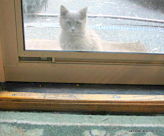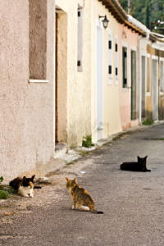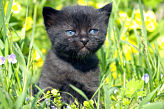Kitten Baby Bottles
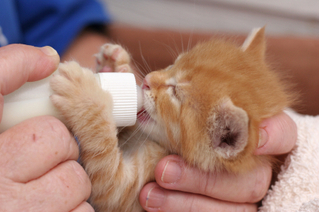
We don’t expect to need kitten baby bottles because although we plan parenthood timing with our own offspring, dealing with a feline baby is somewhat different. In our own lives you may be surprised with twins and rarely more… but with kittens you can have a whole litter of orphans if something happens to mom. You are horrified that they may be euthanized if you take them someplace when they are not yet adoptable and you are faced with huge challenges.
Calling local veterinarians, humane groups and breeders to see if a nursing queen is available for this brood is unlikely to be successful. Investigating these options is worthwhile and if the mother is alive but unable to nurse she can still raise them and that certainly will simplify your life and allow the kittens to learn all the knowledge that mama can teach them. You just have to remember that few organizations have the resources to care for babies that need kitten baby bottles.
Step number one is always to have a vet check out the babies for dehydration and evaluate their current health as well as give you instructions on how to feed them. Plus, you have to be aware that these kittens could have been exposed to diseases that could threaten the health of your current cats.
These kittens won’t be able to benefit from their own mother’s antibodies so they may be vulnerable to diseases in which your cats have come in contact with. Always wash your hands before and after handling them.
Warmth is often more important than and more immediate than food. Place the kitten on a hot water bottle (or heating blanket designed for pet use) covered with a towel or light blanket. Generally, heating pads designed for humans are too risky for pets. Make sure the kitten cannot crawl under the towel to come in direct contact with the blanket. Monitor the heat carefully.
Look for heating blankets or beds that utilize a transformer to reduce power to a lower voltage. A heating blanket or bed should maintain the cat’s body temperature of 102 degrees without exceeding it. However reliable the blanket is rated…make sure the kitten has room to crawl off of the heat source it gets too hot. Wash the heat source blanket or pad according to instructions.
Feeding the newborn kitty with kitten baby bottles isn’t a matter of grabbing a bottle of whole milk. That’s a prescription for disaster. You can buy powdered or ready to use formula made especially for kittens from your vet, pet supply store or some grocery stores.
The liquids are easier to use. Just warm them and pour into the kitten baby bottles. However, when feeding a large litter, powdered formulas are a better value and have a longer shelf life. Feed only 2 tablespoons of formula for every 4 ounces of weight. Very young kittens should be fed every 4 hours.
Kitten baby bottles are available in most stores where you can buy formula but I tend to use an eyedropper with a very tiny kitten. When using a dropper, only release a drop or two at a time initially. As the kitten grows, it’ll be able to pull the formula out of the dropper by itself.
With the kitten resting on its stomach, gently insert the kitten baby bottles nipple or dropper tip into its mouth. Slowly pull up and forward on the kitten baby bottle so the kitten will be nursing with its head extended and slightly elevated. If the formula level doesn’t drop, you either have a clump caught in the nipple or you need to make the hole a bit larger.
If formula comes out of the kitten’s nose, the hole is too big (if this happens, hold the kitten upside down until you see no more milk and he stops coughing). Watch him for the next few days for signs of a possible respiratory infection.
Don’t overfeed your kitten. When the kittens are full, the nipple of the kitten baby bottles pop out of their mouths.
When the kitten is full, place him against your shoulder and gently pat him until he burps just as you would for a human baby. Then take a cotton ball and massage the kitten’s anal and genital area with gentle circular motions to help empty his bowels and bladder. No pressure is needed.
Don’t panic if he fails to have a bowel movement the first time. If, after 4 days, he still fails to have a bowel movement, call your veterinarian. If diarrhea develops, don’t wait more than a day before contacting your vet because kittens dehydrate very quickly.
There is a critical period in a kitten’s development between 2 and 7 weeks of age, in which the kitten learns important socialization behavior from its mother. During this sensitive period they learn about life from their mother and the other kittens.
She teaches them and when she’s not there, those lessons from a mother are missing. This is the time at which a kitten learns what to fear. If it isn’t exposed to people or other pets, chances are it will retain a lifelong fear of people and other pets.
When you take a cat raised in a house with good-natured Labrador it learns a lot about dogs. When a kitten is raised on its own without its mother and peers, the only lessons it can learn are what its foster mother teaches it. Those kittens have a condition called over-attachment. That person becomes the center of their universe. The cat loses all independence. It can turn into a dominating and controlling cat.
Without other kittens with which to play and learn social and predatory behaviors, it turns to the foster parent and acts out those instinctive behaviors on that person. The answer is to get the cat a feline companion but if that isn’t an option then moving toys, exercise and socialization will help.
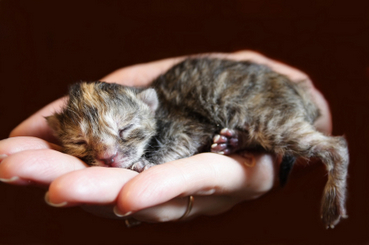
Some socialization aids are standard stuffed plush toys for them to lay next to. A winner is SnuggleKitty (see the Amazon insert) which is a stuffed animal with a pocket for the heat pouch and simulated heartbeat. You will see the kittens gravitate towards it just like they would with their mother.
The Velcro cavity allows several heat sources to be inserted and the heart is the amazing part. It feels and sounds like a cat and the battery will last a couple of weeks. The toy must be washed frequently since the kittens treat the SnuggleKitty like a real mother cat and tend to crawl across it which stimulates their bladders…another positive thing. It is machine-washable on a gentle cycle using a mild detergent like Woolite, and it air-dries.
Another socialization product is KariPet which allows you to carry your kitty close to your body in a sling-like device. You can see these at www.karipet.com
Sometime between 4 weeks of age and 6 weeks, the kitten will probably become interested in more adult food and you can start the process of curtailing the usage of kitten baby bottles. Make a mush of dry kitten food, soaking it in boiling water, and add formula. When it has cooled, place a little on your finger and offer it to junior.
Often he won’t try it this way, so you may have to place a little in his mouth. Even when he starts to eat the mush on his own he will still need kitten baby bottles to supplement his food intake.
Around 3-4 weeks you may notice the linens are damp or you may find a little stool in the box. It’s time to litter box train him. Immediately after you feed him, place him in the litter box.
Make certain he doesn’t eat the littler. (Use only non-clumping or alternative litter for kittens, to prevent them from ingesting clumping litter that might cling to their fur). He will dig and play and try to get out, but eventually he will use the box like a mature cat.
Once you’ve helped socialize the kittens they are ready to be adopted if you aren’t keeping them. Remember that they wouldn’t have had a life if you hadn’t intervened. The sadness of parting with them will be tempered with the knowledge that they are embarking on a wonderful life that you made possible for them.
Related Articles......
Return from Kitten Baby Bottles to Cat Health Homepage
Having trouble finding what you need? Cat Health Index & Site Map
OR
Do you have a question to ask?...Questions
OR
Do you have a cat story to share?...Simply click here to go to that page!
Copyright@2010-2020 All rights reserved.Cat-health-detective.com
This website is information only. Consult a veterinarian for medical assistance

"Like Us" on Facebook
or...
"Like Us" here

